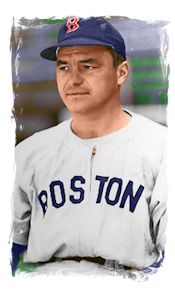 |
Harry "Fritz" Dorish was born on July 13, 1921, in Swoyersville, Pennsylvania. After throwing back-to-back no-hitters in high school, striking out 16 against Plains and 18 against Jenkins Township, he quickly got the attention of a Red Sox scout. He reported to Class C Canton in the Middle Atlantic League and pitched for the Scranton Miners (Eastern League) in 1942, his second year in pro ball. By January 1943, he’d been added to the Double-A roster of the Louisville Colonels, but also added to the wartime National Defense Service roster. He had volunteered for the Army and was assigned as a cook at Camp Shelby, Mississippi. He advanced within the ranks and was attached to a Medical Corps, unit sent to the South Pacific, but also got in a fair amount of baseball. He was mustered out of the service in January 1946, just in time to make spring training. Harry was pitching for the Colonels again. Louisville won the American Accociation pennant and Harry won a couple of their championship games, even driving in a couple of runs in one to help his own cause. By October, he was officially added to the roster of the Boston Red Sox. The Sox were looking forward to 1947, after falling just short of winning the 1946 World Series, and felt they had a trio of new pitching prospects of Harry, Mel Parnell and Tommy Fine would give good depth. Harry was tagged as a starter coming out of spring training, and the Sox were picked to repeat for the pennant, Harry and Parnell joined forces to blank the Braves on three hits in a preseason City Series game. Harry appeared in 41 games for the Red Sox in 1947, starting nine of them and finishing 12 (two complete games) and posting a record of 7-8. His 4.70 ERA was one of the highest on the staff, but he ate up 136 innings and impressed enough to be invited back under new manager Joe McCarthy in 1948. It was but for a brief stay, however, as Harry spent most of the season with the Birmingham Barons. He came to spring training a little heavy in 1949 and was seen to be in some disfavor as a result. He got a little early-season work, but when Boston had to cut down to the 25-man limit he was optioned to Louisville. He worked for the Colonels for a couple of months, was recalled in July, but not used by McCarthy late in the season. Only a few weeks into the 1950 season, he was sold to the St. Louis Browns for an undisclosed amount of cash. The Browns wanted him to develop a curveball, and sold him to Toronto at the end of the season, but the White Sox selected him in the November 1950 Rule V draft. In 1951, the White Sox started him four times, but preferred to use him in relief. By year’s end, Harry was 5-6 with a 3.54 earned run average and was often used in long relief. In 1952, he pitched 91 innings in 39 appearances with a very good 2.47 ERA. In 1953, he got in his most work ever, with 145 2/3 innings and was 10-6. In 1954, he threw over 100 innings again, with a 6-4 mark and a 2.72 ERA. In 1955, the White Sox traded him to the Orioles. After 19 2/3 innings in 1956 without a decision, and a couple of months after receiving 12 stitches in his heel from being spiked, he was placed on waivers and claimed by the Red Sox in June. The Sox needed help in the bullpen but Harry didn’t see a great deal of action, and was 0-2 with a 3.57 ERA. In October 1956, he was given his unconditional release. Not ready to give up yet, he signed on with the San Francisco Seals for 1957 and wound up as 9-12 with a 3.32 ERA. He played for Minneapolis in 1958 and started 1959 with the Millers, but was acquired by Houston, only to be cut loose. He appeared in only four games combined with the two clubs. Harry promptly took a scouting position with the Red Sox. When newly-named manager Johnny Pesky appointed him as his pitching coach for the 1963 edition of the Red Sox, Harry had been a regional Sox scout for three years (1960-62), and had helped out Pesky as Seattle’s pitching coach during spring training when Johnny managed the Rainiers. His emphasis on running may have hurt Harry’s longevity with the ball club, because some of the pitchers complained to GM Mike Higgins. Harry was fired on the very day the last game of the 1963 season. Harry quickly found work scouting for Houston, which he did for three years through 1966. In February 1967, he was named manager of the Jamestown (New York-Penn League) Class A farm club of the Atlanta Braves. In November, the Braves named him as pitching coach for the Braves, beginning with the 1968 campaign. After four years with the Braves, Harry was offered the role of pitching instructor in the minor league system and did that for two seasons, then moved to the Cleveland Indians system in the same capacity. He worked for the Indians from 1974 through 1976, then hooked on with the Pirates in January 1977. In November 1981, he joined the Cincinnati Reds as their minor league pitching instructor and held the position through 1988. After fully retiring from the game, Harry enjoyed a much quieter life, partly as an avid golfer and did occasional volunteer work with the Make-A-Wish Foundation. In later years Harry Dorish suffered from a progressive neuro-muscular disease and died from its complications, at age 79, on December 31, 2000, in Wilkes-Barre, Pennsylvania. |
|||||
